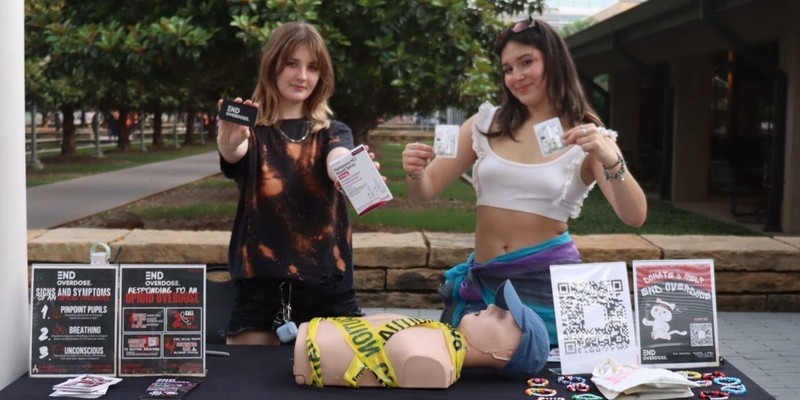End Overdose's chapter program is vital to our success in equipping young people with lifesaving education and resources. Rather than proselytizing from a soapbox to Gen-Z and Millennials, we trust young people in cities and on college campuses to spread the word through a true peer-to-peer model. With 50 chapters nationwide, our members and volunteers are committing endless hours to End Overdose's cause, so we want to highlight a chapter every week.
Today, we're proud to highlight our UT Dallas chapter! We spoke with chapter president Aspen Hough about the partnerships she's developed in Dallas night life, distributing 1,600 doses of naloxone in just the spring 2025 semester alone, and much more.
What sparked your interest in overdose prevention and End Overdose in particular?
I’ve thought about this a lot — why I care so deeply. I haven’t lost someone close to overdose, but that fear lives in the back of my mind. It feels like everyone knows someone. Someone from my high school passed away, and it shook our community. I’ve always believed that no one deserves to die, and I’ve never understood why that’s controversial. I first got interested in overdose prevention during high school when I did my capstone project on addiction recovery. As a neuroscience and psychology student, I knew I wanted to continue this work throughout my studies and future career. I found End Overdose through Cami Petyn’s TikTok, and soon after, I volunteered at Electric Forest. That experience was unforgettable and solidified how vital this work is. The second I got back home, I applied to start a chapter at UT Dallas.
Can you describe your experience as chapter president of UTD?
It’s been one of the most challenging but rewarding roles I’ve ever taken on. Starting this chapter from scratch, especially in a setting where overdose prevention is still stigmatized, hasn’t been easy. But every naloxone kit distributed, every conversation had, every life possibly saved — it makes the tough moments worth it. Through this chapter, I’m learning how to lead, advocate, and most of all, how to show up — for my community, my team, and this mission.
How have you developed authentic connections within the community?
Most of our strongest partnerships have come from tapping into the communities our team members are already part of. I’m deeply involved in the Dallas nightlife and music scene, and that’s allowed us to build trust and visibility where overdose prevention is needed most. Our former VP, Pranav, was an EMT on campus, and through him we’ve worked closely with UEMR. Our new co-president, Hassan, forged our relationship with Hyperpop Hell, which has been incredible — they’ve supported our work consistently through hosting fundraisers and connecting us with other organizations in the community.
What are the major highlights from your chapter’s work to date?
There are so many moments I’m proud of. This semester, We’ve hosted 22 events and distributed over 1,600 doses of Naloxone. We recently partnered with the Center for Students in Recovery, and inspired the creation of our University Emergency Medical Response team’s Public Health division, whose first mission was to get naloxone distribution in our university residence halls. Right now, my chapter is in the works of expanding off-campus into the greater Dallas-Fort Worth area. And we are about to host a training booth at Illfest in Austin. I am so proud of the work that we have accomplished, and how we have been able to expand End Overdose’s mission throughout North and Central Texas.
What do you envision for the future of your chapter?
I want to continue to expand End Overdose throughout Texas. As we create new chapters, I want to unify and work together to maximize our impact in the state. I want to build a team that can support outreach at music festivals, nightlife events, and community organizations across Texas. There’s such a need for this work, and we’re just getting started. I also want to reach broader demographics — students, yes, but also sober living communities, unhoused resource centers, and beyond. My goal is for overdose prevention to become something normalized and respected in all these spaces.
